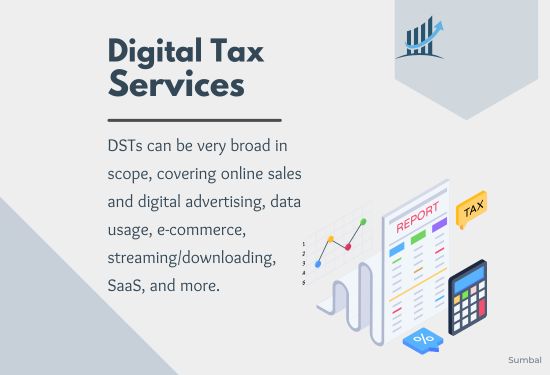Online businesses operating in the fast-growing digital economy face challenges from the digital services tax, DST. This is one of the latest trends in international taxation, and thus, it is crucial for organizations conducting online sales to comprehend it.

What is Digital Services Tax?
A tax on money received from digital services is called the Digital Services Tax (DST). It mainly targets big technology corporations that offer internet products and services like digital marketing, internet selling, broadcasting, and social media. In contrast with traditional corporate taxation, DST is determined as the actual share of the local company’s revenue that was obtained through the provision of digital service.
DST is designed to target companies like Google, Amazon, and Facebook, which realize significant revenues in many countries but, because of their business models, pay mini corporate income taxes. DST-imposing countries want their fair share of tax from these firms that reap income from local markets but do not have a physical presence in those markets.

Why Are Countries Adopting Digital Services Taxes?
DST has emerged mainly as a reaction to the problems that arise from trying to tax the digital economy using traditional law. In the past, corporate taxes were determined based on the physical location of corporations, although digital commercial ventures can conduct operations and make profits in countries without a local office or workforce. This helps them transfer their profits to countries where taxes are less, lowering their taxes.
Consequently, countries started adopting DST to create value that digital businesses must add to their respective economies. DST has been supported by the European Union, and several member nations, including France, Italy, Spain, and the UK, have brought forward their own sorts of this tax. While the rates and specifics vary, the goal is the same: to tax digital sales where they occur.

How Does DST Impact Online Businesses?
The DST directly targets online businesses that generate a prescribed level of revenue and primarily targets small multinational businesses. Nonetheless, smaller digital businesses and startups must also map the DST landscape if they plan to go global.
Here are a few key ways DST can impact online businesses:
Increased Costs
DST is a tax on revenues, not profits, which can be a problem for companies with thin margins. Due to this extra cost, consumers could potentially bear this cost through increased prices for products or services.
Compliance Challenges
DST regulations have complex rules and regulations for digital businesses that differ from country to country. Every state may have different values, frequencies, and filing procedures, which can be very expensive and time-consuming.
Market Expansion Considerations
DST can be a consideration for online businesses, for instance, as they consider where to expand. The increase in taxes poses a problem in that some countries become uncompetitive, particularly for small enterprises.
Impact on Innovation
The increased costs and regulation that DST entails may cool the enthusiasm of some firms for issuing new digital goods and services. This might slow advancement in those areas that are most accurate by DSTs.





